We’re delivering our Game of Thrones recaps in a series we call Game of Thrones Unlocked. These articles will contain spoilers through the episode under discussion. This week, Peter Fenzel tackles “The Spoils of War” (Season 7, Episode 4).
Three hundred years before the events of Game of Thrones, Aegon Targaryen waged a war of conquest to bend all the knees in Westeros. At the time, the Lord of House Lannister, the King of the Rock, combined the armies of Casterly Rock and Highgarden to strike back at the foreign invaders.
The native Westerosi met the Valyrian armies and dragons at a battle in the West, since known as the Field of Fire. The grass was dry that day, and the air and the ground burned.
At the Field of Fire, the Targaryen dragons burned nearly 15,000 men. A third of those died. Two thirds suffered but lived, though not to fight again. One of the Targaryens took an arrow to the shoulder. The victory was decisive. The power and pride of the West were extinguished.
Fans of Game of Thrones and the Song of Ice and Fire book series who go deep into the lore have expected a second Field of Fire for a long time. It’s the quintessential lore event for the awesome power of fury unleashed and the terrible human cost of weapons of mass destruction. The Field of Fire symbolically recalls the red poppies of Flanders Fields, the napalm of Vietnam, the fire-bombing of Dresden, as well as a pure triumph, and a totally sick dragon thing to airbrush on the side of a van—in the lore-heavy books, anyway.
Such an event had to repeat in the events of the story; it was too important and symbolic not to. Daenerys Targaryen, like her ancestors, was destined to fly into the West and mow down the final flowering of chivalry. She’d declare a colossal, tragic, awesome victory, through a show of overwhelming firepower, administered with extreme prejudice.
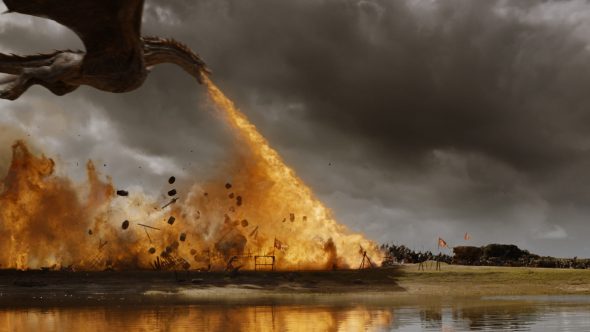
This week on Game of Thrones, fans got their wish. It was high on awesome, low on tragic, high on firepower, and on prejudice? Medium.
The cost? The gold Cersei needs to pay off the Iron Bank is headed for the Khaleesi Collection. The lives of many people who don’t matter ended horribly. Capping it, garbage human and privilege beneficiary Jaime Lannister plunged into an aquatic cliffhanger, and in a week or two we’ll see if his plot armor came with a snorkel.
You Know That Thing We Were Going to Do? Let’s Not Do That.
Perhaps Jaime deserved to die, as this seemed the episode where characters across the plot lines realized they are stuck in Game of Thrones episodes and should expect that things that sound like good ideas will not actually work out. Everything sucks, victory is always fleeting, and few things come with lower expected value than taking a stand for loyalty and what you believe in.
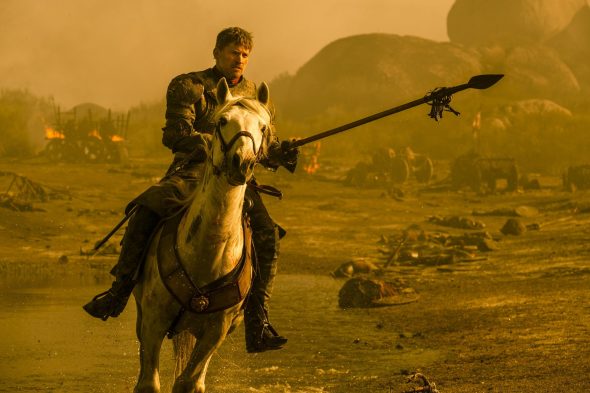
In that critical moment, where Jaime charged, pulling a spear from a fallen body, hoping to win the war in one stiff poke, he was the only person in a thousand-mile radius not giving the old resume and cover letter a good hard look and considering his other options for employment.
As Davos joked to Jon when hearing about the loyalty the Essosi on Dragonstone have for Daenerys, “Would you blame me if I changed sides?”
No, Davos, we probably wouldn’t. Nobody would. When the world is falling apart, flexibility starts looking just as important as loyalty.
This week, most of the cast agreed with Davos. That would suggest they are on to something, because they usually aren’t on Team Reasonable.
Possible Free Agents
Bronn—a mercenary, lest we forget—half-threatens to bail on Jaime for not liking his payment, and gets his Judas Iscariot moment as his sack of gold pieces fall useless in the burning dirt. Ironically, the castle he wanted, that Jaime insisted Daenerys would seize, was the one thing Daenerys did not seize.
The Iron Bank, which had previously supported Stannis, waffled on supporting Cersei like any good Belgian bureaucracy. Certainly they’ll have changed sides in the aftermath of her critical failure to diversity her assets to a wider arrangement of flammable wagons.
Jon showed Daernerys some cave paintings of the Pact between the First Men and the Children of the Forest—a doomed alliance where one side was genocided shortly after the war ended, but who’s counting—and very nearly bent the knee right then and there in the dark.
Of course Jon is right that his people would not accept her rule, and Daenerys is wrong in thinking Northerners follow the King above their own customs. But, the Mother of Dragons has a tested and proven ability to sound correct even when she’s never met the people she’s talking about. And it’s a bastard’s prerogative to change his mind.
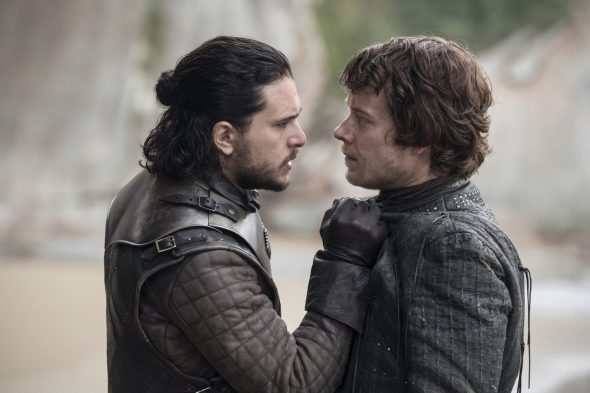
And Theon Greyjoy arrived hat in hand to Dragonstone, waiting to see which of the equally defensible positions regarding his life or death were going to be advanced today. His crew looked on at him in disgust for his lack of conviction.
The one thing we know from Jon Snow’s Jack Bauer lapel-grab of the horribly traumatized turn-cloak who used to be like a sort of brother to him, is that whatever anybody does with Theon, they’re not going to be happy about it!
Starks Raving
And every week Sansa Stark looks at her growing cluster of damaged family with a building surge of politely suppressed horror and confusion. Arya came back this week, and she’s already copping to spree killing and stealing Sansa’s bodyguard. Bran came back last week, but now he’s crushing breakups with the same cringy lack of tact that he previously crushed rape-night reminiscence.
In the silent moments where Sansa watches her family, you can see the wheels spin. The look is familiar to any sister whose brother went to Hot Topic one day and came back with a chain wallet and an attitude problem, except Bran did it so hard that he is now more chain wallet than human.
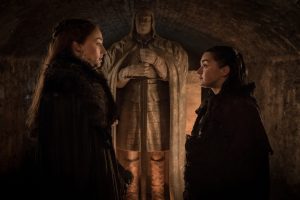
“Do I have to call you Lady Stark?” asks Arya.
“Yes,” says Sansa, knowing, that while most of the characters in this episode will question their loyalty or give cause to others to question it, the status quo for her, at least, seems stable. Breastplates still need leather on them, dammit, so, unlike me at my meetings with Jon, please respect family hierarchy.
Poopy Things
At least Sam was nowhere to be found this week, and neither are the Hound and his Howlin’ Commandos. Sandor and Tarly specialize in persisting at what they are doing despite crappy circumstances, figurative and literal. They had no place in this week’s across-the-board questioning of intention. Sam didn’t clean out those bedpans a few episodes back with either doubt or hesitation.
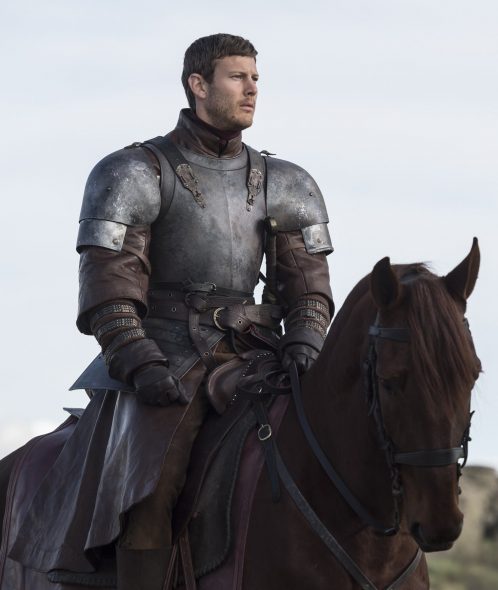
Speaking of crap, Sam’s brother Dickon found out at the Battle of Highgarden that the smell of human feces has a nasty way of closing the gap between a person’s emotions and experience. These brothers are getting closer every week.
I had to stop and replay the episode to see if it was Dickon or Bronn who saved Jaime from the fire, but the long hair and leather jerkin meant Dickon Tarly is probably alive to fight another day (unless I missed him eating it in the fifteen minutes of relentless screaming, which is entirely possible).
By the by, Jaime Lannister telling Dickon he had to kill his friends because his friends betrayed the queen seems awfully ironic in retrospect, since all Jaime had to do to survive the episode without a future comic book resurrection was show just slightly less commitment to his cause. Loyalty isn’t such a great guarantee of life or safety after all.
Convergence Watch!
By the way, Jaime dying in the water opens the possibility for a cool shortcut to bring the show into the books’ endgame. In the books, Jaime is currently headed to the Brotherhood Without Banners, to face a zombie Catelyn Stark, who was pulled from the water by a wolf and resurrected. There’s a chance he may himself die and be resurrected in this future encounter.
If, after this second Field of Fire, Jaime is pulled from his Dunkirking and resurrected, he might arrive at a similar outcome: A walking zombie who can’t go home to his ruined country, except cutting out two books of plot and replacing them with completely different stuff.
Cersei also mentions using funds from the Iron Bank to hire the Golden Company and bring them to Westeros. In the books, the Golden Company is a bunch of exile mercenaries who want to invade Westeros anyway for complicated reasons involving old sibling rivalries in one branch of the Targaryen royal house. If Cersei hires the Golden Company about when Daenerys comes down on her like hellfire in hair extensions, this could bring us, somehow, to a pared down, simplified version of the military situation after The Winds of Winter, by other means. Or it could just be fan service.
And while it seems doubtful that Tyrion’s ludicrous plan of attacking with little or no reconnaissance or communication from three sides of a continent at once will repeat in the books in the same way, a second Field of Fire seems likely there as well, in both cases leaving fewer emotional obstacles by the day between Daenerys Targaryen and the explosive caches of wildfire buried in wait to cook a city of a million people in seconds if they happen to encounter some sort of unexpected ignition source.
All roads lead to Fire and Blood, it seems.
Swirls and Thetas
Note that when Jon brings Daenerys to the cave (and he loves to make his move in caves—the last woman he did that to he’s marrying in real life), chalk outlines on the walls depict turned thetas and spirals. Jon identifies them as the drawings of the Children of the Forest, but they are also the configurations that the White Walkers leave murdered bodies in.
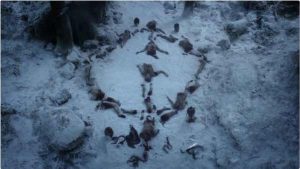
Early in the Story
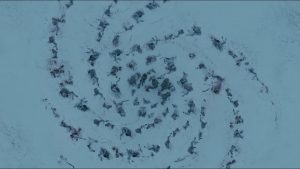
After the battle at the Fist of the First Men
And they’re also similar to the configuration used in the ritual where Daenerys unknowingly hatches her dragons:
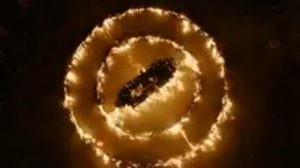
The lore for these symbols in George R.R. Martin’s work goes very deep (the implication, unlikely as it is, is that the people in Game of Thrones, and maybe even the White Walkers, are distant descendants of spacefaring human scientists from Earth), and the connection in the show is likely just aesthetic.
But if we wanted to read this strictly, the implications are that either Jon’s assessment of the meaning of the cave drawings is wrong, or the White Walkers have different intentions than we think they do and are trying to send a message of peace in the worst way possible, or the Night’s King has a dry and bitter sense of irony. Because if the Children of the Forest and the First Men used those symbols to sanctify their peace treaty, it might not make sense for the White Walkers to use the same symbols to declare war.
If Bran is somehow behind all this, which seems likely, since our story is starting to look like it needs a machina to start bringing in a deus or two in order to wrap up in time, he seems just disconnected enough from humanity that he’d think sending an ancient symbol of peace from race to race using strewn body parts would read as “symbol” first and “strewn body parts” later.
At any rate, it’s an interesting detail with a ton of possibilities for all your pet theories, which the show gets to urge on or smash on a very quick timeline these days, at least until the end of August.
This Show Loves Board Games Now
The season started by very clearly lining up all the players and where they live, even to the point of using literal wooden game pieces to represent them: Highgarden, Dorne, Dragonstone, Cersei at King’s Landing, the Lannister Army, the two Ironborn factions, the North, the Army of the Dead.
With four of seven episodes gone, we’ve knocked out three of the nine factions—Highgarden, Dorne, and the Lannister Army—leaving two simpler axes of conflict: between Dragonstone and King’s Landing, and between the North and the Army of the Dead, with the Ironborn playing spoiler and Littlefinger awaiting whatever sort of harvest he will reap for his many betrayals.
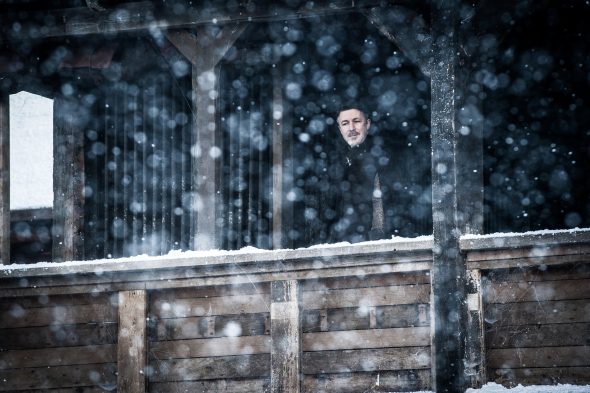
There’s an implicit change in the rules that happens late in most games of musical chairs, when the participants and chairs pare down to a small enough number that you can see everyone else and comprehend all their movements. If anybody didn’t try before, this is when they try. This is when elbows start getting thrown and people actually start getting hurt in every round. There are no more safe episodes anymore.
It seems likely our show is accelerating the same way. And that’s fitting, though why depends on your cynicism about the legitimacy of power and the desire for power. Either musical chairs is the smallest Game of Thrones, or the Game of Thrones is the largest set of musical chairs.
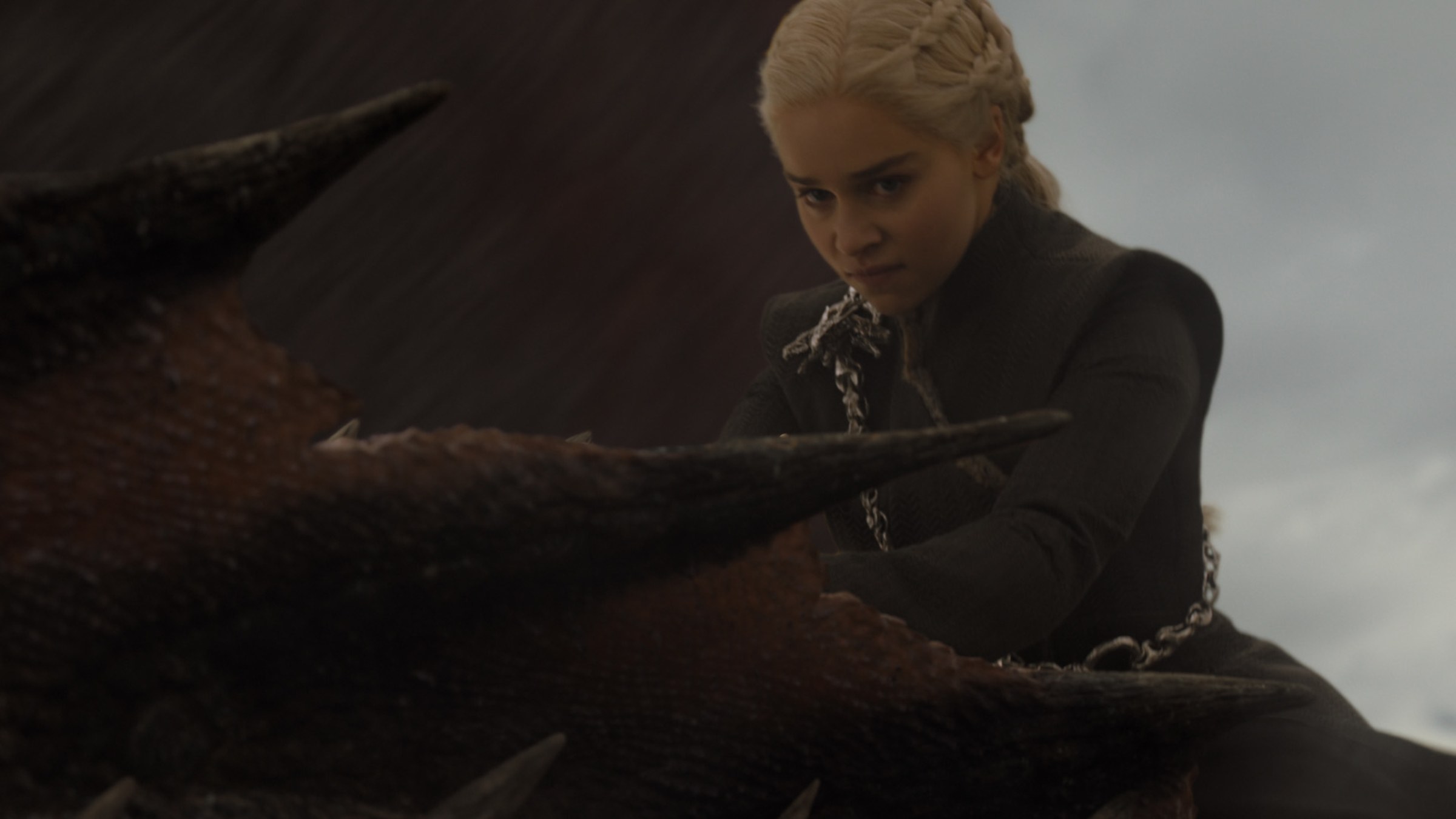
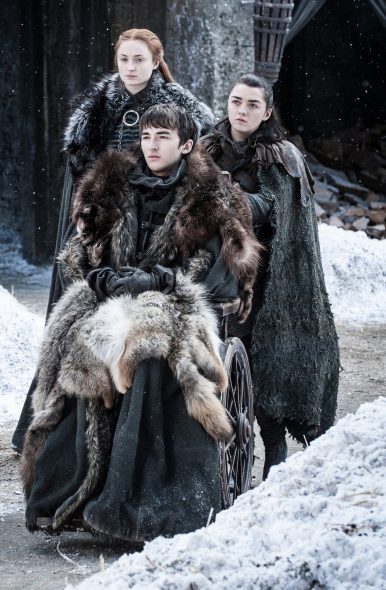
This was pointed out to me by a friend: Notice how Jaime scolded Bronn earlier in the episode, saying “The more you have, the more it weighs you down?”
Says he with the Gold Hand.
I doubt Jaime is dead. Theon survived his firey plunge, so should Jaime,
Except Theon was wearing naught but leathers, and even he had to be pulled from the water. Jaime is wearing heavy plate mail and has one functioning hand which, without a deus ex machina, spells le drowning for sure.
I’m pretty sure that Randyll Tarly tells Jamie that all the gold made it into Kings Landing.
So what Dany and Drogon burned up (other than some very unfortunate soldiers) was actually the food they’d been taking from farmers and towns in The Reach. Considering she’s about to also besiege that city, I guess it’s a way to “encourage” Cersei to just relinquish power. Or for someone to relinquish it for her.
Ah, great! So the food that was going to feed the capital has burned. Before hearing that, Daenerys was looking a little short on “comeuppance” – now, it’s about right.
Poor Rickard Stark. The other Starks don’t even mention him. He was the Expendable Stark.
Inflammable if not expendable.
Although I’m not sure whether what killed Rickard stark first was the burning or the hanging.
One of my lingering questions from this episode: What up with the Tarly’s?
The last few episodes have definitely tried to make us care who Randyll Tarly is, and this episode gave Dickon some nice moments. But for what purpose? I at first thought they were just setting up some named characters to be killed so that the battle would have some more heft (see also: the Sand Snakes). But it doesn’t really seem like either Randyll or Dickon died in this battle? Where did Randyll even go in this battle?
My guess: Randyll staggles back to King’s Landing and becomes Cercei’s new top general or whatever, while Jaime is MIA/presumed dead. This gives Cercei some time to go full Mad Queen, with a general more than willing to carry out whatever terrible thing she does next. This sets up the Jaime/Cercei conflict that at this point seems inevitable.
Final note: The actor playing Season 7 Dickon is able enough, but I for one miss Season 6 Dickon, played by the guy from “UnReal.”
I know this isn’t the most fun way to think about it, but I think it’s a fair assumption that Pappa and Boy Tarly are around so Sam can meet one or both of them at The End of All Things and get some sweet sweet character growth/resolution.
On a more OverthinkingIt note, I’d say Team Tarly (excluding Sam, natch) is kind of a replacement/stand in for Tywin Lannister’s old-guard sensibilities and hard-headedness. At this point, a lot of the older generation are gone (RIP Queen of Thorns) and there’s few ‘reasonable’ old-school warrior/commanders left to provide contrast and lead armies. I’d be curious if anyone had thoughts on the differences between the two?
In the books, Randyll Tarly represents a pretty important, though subtle, change from the feudal order dominated by Tywin Lannister.
In the books there’s an important subtextual plot about five competing legal systems in Westeros – the ancient laws of the First Men, the ecclesiastical laws of the Faith of the Seven, the traditional order of the Westerosi nobility and the Great Houses, the generally unsuccessful attempt by the Targaryans to install some form of proto-absolutism over this feudal order, and then the legal systems of the Free Cities, which include Dornish Law, which descends from the Rhoynar.
Under the Targaryan regime which incorporates the Great Houses, the small council has an office called Master of Laws whose practical authority is mostly limited to King’s Landing – it’s a job that can be done by somebody like Renly, kind of a sinecure given to somebody from a great house that doesn’t appear to involve highly specialized knowledge.
One of the things that happens during Cersei’s regime largely without her knowledge, or at least awareness, is her small council starts reconstituting the systems of authority more in the model of the Free Cities and less in the traditional Westerosi model.
One of the big differences here is Randyll Tarly is appointed to the senior legal authority on the Small Council, but this position is renamed “Justiciar.”
In the old Westerosi system, trials are presided over by lords and the lords of Great Houses are the supreme legal authority in their territories. They may appoint judges for specific cases, but ultimately the authority is feudal, inherited and associated with the rights of a vassal over a fief.
In the Free Cities system and Dornish law, trials are handled by magistrates called… Justiciars.
A Justiciar is an old English and Scottish title for a deputy who is entrusted with legal authority by the sovereign. They represent the will of the sovereign, not the authority of a feudal lord over a holding.
In the books Randyll Tarly becomes a sort of “traveling law show” where he rides into town, sets up a court, hears cases, decides them, and carries out punishments, including executions – even in places nowhere near where he is from (I believe it happens in Saltpans in the books – a sacked town that does not appear in the show and I think is sort of substituted for by that farmer’s house the Hound goes to).
This is a pretty huge departure from the way trials work in the rest of the story, and the rise of a professional magistracy with specialized skills is a pretty big change.
Because the big thing about Randyll Tarly is that he’s _competent_. He is good at his jobs, he has experience and demonstrated success. He has the right combination of nobility and skill to succeed in a more meritocratic system.
And if/when the Golden Company also comes in from the Free Cities, with their professional way of managing themselves by promotions of merit rather than of birth, Randyll Tarly will likely fit right in.
The rise of a class of professional soldiers and judges with meaningful authority is a pretty big problem or opportunity for Cersei, but it could also be a huge problem for Daenerys, who intends to rely on her birthright to assert her claim to the throne – and similarly for Jon Snow.
In the eyes of guys like Randyll Tarly – men who are aristocrats, sure, but who primarily see themselves as career soldiers – a romantic aristocrat like Dany or Jon is a frivolity that mostly serves to prevent them from doing their jobs.
In other words, Randyll Tarly in his attitude toward Sam and toward everyone else is like Alister Thorne x 1,000.
This is a really interesting shade to Randyll, but I think you might be overestimating the distance between the more-meritocratic order represented by him and Jon and Dany. A regent like Jon and Dany are EXACTLY who you would need to transition to a more meritocratic system. They were both thrust into a situation that required them to sink or swim on their own merit, and both of them have little patience for courtly politics and nobility. They’ve both spent large amounts of time and put their lives into the hands of all sorts of low lifes.
Sure, Dany relies on her blood to undergird her legitimacy to the throne, but other than that she’s a downright revolutionary. Jon is kind of a weird blend – because he grew up under it, he probably has more of a buy-in to the traditional system of feudal nobility, but as a bastard and then a man of the Night’s Watch, he was always on the outside looking in, and has had ample opportunity to see how such a system can fail.
So if Randyll Tarly is looking for a monarch who Wants Results Dammit, he’s probably playing for the wrong team.
Notice how Jaime scolded Bronn earlier in the episode, saying “The more you have, the more it weighs you down?”
unn.edu.ng
This posting bot amuses me… Granted, no one is likely to be fooled into going to its web page, but it’s successful enough at snippet grabbing that it might pass for human on a lesser website. (One where there’s a deeper pile of ‘me too’ posts, and less attention to completing a thought.)
I’m not saying it should be king of the 7 Kingdoms, but it clearly has at least Tommen level intellect.
I continue to be fascinated by how the North is dismantling the Patriarchy. First, Lady Mormont insisted that women and girls be trained to fight. And then, according to tradition Bram should be in charge of Winterfell as he is the only surviving Stark son. But everyone seems to agree that Bram would be pretty much useless in that role.
I keep waiting for Sansa to pick up a sword. Maybe she assumes that Brienne and now Ayra will protect her.
We are basically down to a battle between two Mad Queens, Cersei and Daenerys, although Dany may just be supremely self-confident rather than megalomaniac.
I should hate Jaime for many reasons, not the least of which is his murder of Olenna, who will forever be my hero for killing Joffrey. Yet a have a soft spot for Jaime as he has suffered a lot and he is very brave. And Nikolaj Coster-Waldau is pleasant to look at.
regarding board games, here is a thing GRRM is certainly aware of (he designed it) and the showrunners likely are as well, as the map is EXACTLY that shown at dragonstone and Cercei’s floor art. My contention for some time is the main army plotpoints of the whole series of books is predicated on the first test match of this game.
https://www.fantasyflightgames.com/en/products/a-game-of-thrones-the-board-game-second-edition/
Oh wow! I actually have this game at home and have played through it once. I wish I’d seen the image is the same – that’s quite a catch!